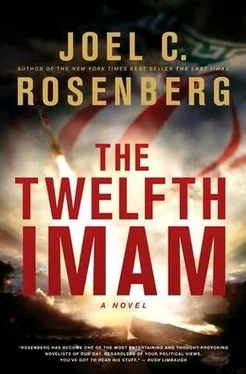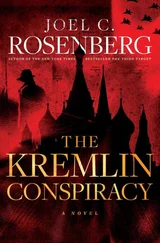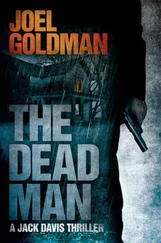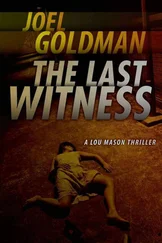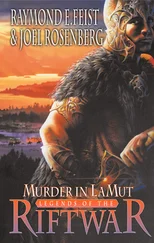But it wasn’t simply the gruesome image of the executioner’s blade slicing the man’s head off and the massive flow of blood that threatened to prevent Najjar from ever sleeping peacefully or innocently again. It was the fact that the man hadn’t been given a fair trial in a court. It was the fact that neither Najjar nor his colleagues had seen a single shred of proof against the man. It was the fact that this man was a fellow Muslim, yet he had been shown no mercy. Worse, it was the fact that Najjar now knew why the man had looked so familiar.
For in his most recent nightmare, Najjar suddenly came to the realization that this was the man he had seen kidnapped back in Baghdad years before, the man whose family he had seen slaughtered execution-style on Al Rasheed Street.
Syracuse, New York
David parked at Hancock Field and raced into the terminal.
He was intrigued by the letter from Portland and its bizarre timing, but that would have to wait. David was devastated by news of his mother’s cancer. He couldn’t imagine his mother not being there for him. Nor could he imagine his father living all alone. He rued all the years he had missed spending time with them both-summers, birthdays, holidays. They were all gone now, and he could never get them back.
First things first, he called a local florist and ordered two dozen yellow roses-his mother’s favorite-to be sent to the house with a note asking for her forgiveness for not being able to stay longer. Next, he dashed off an e-mail to Zalinsky’s administrative assistant, informing her that he was leaving the Agency’s car at the Syracuse airport. Then he checked his bags, got his boarding pass, and cleared security just in time to catch the flight to Atlanta.
Finally, sitting on the plane, he steadied his breathing and reached for the letter in his briefcase. But fear got the better of him, and he put it back unopened. It might not even be from her, he realized. Even if it was, it might not be friendly. A thousand scenarios raced through his mind, and David wasn’t sure he was ready for any of them.
Once in Atlanta, he quickly identified the NOC waiting for him. With a lightning-fast “brush pass” near a newsstand in the domestic terminal, David was given a Nokia N95 smart phone. Moments later, he crushed the SIM card for his current phone and discarded it in a trash bin near the food court. A few minutes after that, he discarded his BlackBerry in a trash bin in the men’s room.
Now that his company, Munich Digital Systems, was working with Nokia Siemens Networks, he needed to play the part and carry the tools of the trade. The N95 was Nokia’s top-of-the-line 3G phone, functioning more like an iPhone than like a BlackBerry. Nevertheless, the N95 he now held in his hands was not a normal one. Rather, this was a special version that had several features embedded by the techies at Langley.
First, a proprietary GPS function allowed Zalinsky and the Agency to track David’s location in real time without anyone being able to detect that such tracking was going on.
Second, the phone was preloaded with the names and contact information of people David would be expected to know in his consulting role. More importantly, any new names, phone numbers, and e-mail addresses he added to his contact directory would be instantly and clandestinely uploaded to Langley and the NSA’s mainframe computers. This would alert both agencies to hack in and begin monitoring those phone numbers and e-mail addresses as new high-priority targets.
Third, and perhaps most importantly, while the phone typically operated on standard frequencies, allowing foreign intelligence agencies to listen in on his calls and thus to be fed disinformation, a proprietary encryption system could be activated to enable the user to make secure calls to Langley or to other field agents. This was only for rare cases and extreme emergencies, because once the software was activated, those monitoring David’s calls would know immediately that he had “gone secure,” potentially risking his cover as a consultant for MDS.
As he headed for concourse T, David surfed the Web, trying to get familiar with the phone. As he did, he came across the latest diatribe by Ayatollah Hosseini, Iran’s Supreme Leader, given in a speech in Tehran at a conference of terrorist leaders from Hezbollah, Hamas, and Islamic Jihad.
“Like it or not, the Zionist regime is heading toward annihilation. The Zionist regime is a rotten, dried tree that will be eliminated by one storm. And this is just the beginning. Today, the time for the fall of the satanic power of the United States has come, and the countdown to the annihilation of the empire of power and wealth has started. Get ready for a world minus the U.S.”
Maybe he should bring home this guy’s head in a box, David mused. At least they knew where to find him.

Upon reaching concourse T, David finally looked at his itinerary.
For the first time he realized that on this upcoming flight to Dubai, he had a middle seat in economy on a fourteen-hour flight. That wouldn’t do, he decided. He set his sights on an upgrade to business. Waiting until he could get a few moments alone with the attractive young woman at the Delta counter, Yasmeen, he asked if there was anything she could do to take pity on him. Anything would be better than a middle seat.
“Are you a SkyMiles member?” she asked.
“No-how can I sign up for that?” he replied.
“Well, Mr. Tabrizi, I can give you the form to fill out, but I’m afraid I’ve only got one seat left in business, and that’s typically reserved for members with Diamond Medallion status.”
“That doesn’t exactly sound like a no,” he whispered.
“Well, I really shouldn’t,” she said, her eyes darting around the lounge.
“Of course you shouldn’t,” David said, smiling and continuing to keep his voice low. “But I’d never tell.”
She bit her lip.
Then David had a thought. “Are you working this flight?” he asked.
“Yes, why?” she replied.
“In business?”
“As a matter of fact, yes.”
“Well, maybe I could return the favor when we’re in Dubai,” he offered.
“What do you mean?” She was intrigued.
“Ever been to the top of the Burj Khalifa?” David asked, referring to the world’s tallest building, the glamorous monument to man’s engineering genius that had recently opened in the heart of the business capital of the United Arab Emirates.
“To the observation deck?” she asked, looking disappointed. “Of course; everyone has.”
“No, no, above that,” he said. “There’s a private suite no one knows about. The owner uses it for exclusive dinners with his best clients.”
“Really?” Yasmeen asked, her beautiful brown eyes growing large. “I’ve never heard that.”
“Actually, I know the owner,” David said. “His son and I went to college together at Yale. He said I could use it the next time I’m in town, and I was thinking, how about we have dinner up there Wednesday night, just you and me?”
And that was that. David was suddenly holding a ticket for seat 5A, the last available seat in business. But his conscience was killing him. He didn’t know the owner of the Burj. He hadn’t gone to Yale. He had no intention of taking Yasmeen to dinner in Dubai. He’d simply done what they’d taught him at the Farm-win friends and influence people and use them for his own purposes. At the beginning, he’d been surprised at how easy it was for him, convincing people to do things they didn’t want to do. Now he was surprised at just how terrible he felt for lying to this woman. What was wrong with him?
Читать дальше
